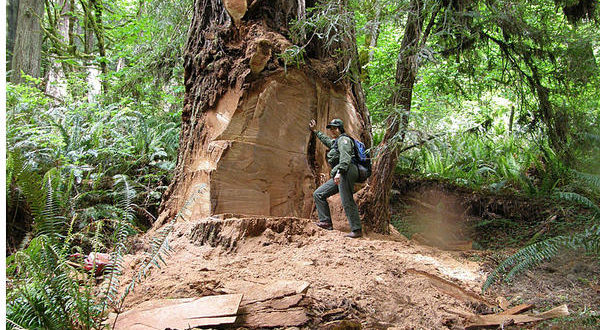Criminals Take Chain Saws to 1,000-Year-Old Redwoods
Published on April 16th, 2014
Noel Brinkerhoff
April 15, 2014
AllGov
Some of the world’s oldest trees, located along the Northern California coast, are being butchered by poachers hoping to sell their loot to manufacturers of decorative furniture and home goods.
Burls, the knotty growth found on ancient redwoods, are the focus of the wanton destruction that has left massive scars on the trees and endangered their growth and reproduction.
Poachers prize the burls because they contain intricate wood patterns sought by makers of tabletops, clocks and other home furnishings. Items made from burls can fetch hundreds if not thousands of dollars, making the collection of burls a lucrative—and often illegal—trade.
The cutting off of burls, often done crudely with chainsaws, has been a problem for those managing old-growth redwoods for decades. But, recently, the problem has become acute as drug addicts and the jobless struggling to make money have ramped up their poaching in Redwood National and State Parks in Northern California.
Rangers managing these lands have started closing at night a road popular with tourists, the Newton B. Drury Scenic Parkway, in an effort to keep thieves from getting at the trees. The rangers can’t do much else, given that there are not enough of them to cover a park of 133,000 acres.
One ranger, Laura Denny, told the Associated Press that she knows of only two or three arrests in the last 12 years for poaching.
And even when poachers are caught, their crimes usually result only in fines, although the crime can be classed as a felony depending on the value of the burl.
Comparatively few of the ancient redwoods that used to span a large portion of Northern California remain today. From the two million acres that existed in the 19th century, the state now has only 5% of that total, nearly all of it contained in the Redwood National Park.
The poaching threatens future generations of the majestic trees. That’s because the burls contain a tree’s genetic code and are responsible for sprouting a clone before it dies.
“How many do we have that we haven’t found?” Brett Silver, the state park’s supervising ranger, said of the poached trees, according to the New York Times. “It’s not just a property crime. It’s a legacy, like hacking up a church.”





